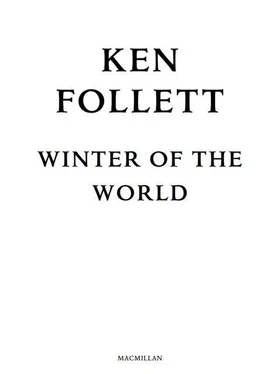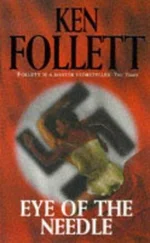Ken Follett - Winter of the World (Century Trilogy 2)
Здесь есть возможность читать онлайн «Ken Follett - Winter of the World (Century Trilogy 2)» весь текст электронной книги совершенно бесплатно (целиком полную версию без сокращений). В некоторых случаях можно слушать аудио, скачать через торрент в формате fb2 и присутствует краткое содержание. Жанр: Старинная литература, на английском языке. Описание произведения, (предисловие) а так же отзывы посетителей доступны на портале библиотеки ЛибКат.
- Название:Winter of the World (Century Trilogy 2)
- Автор:
- Жанр:
- Год:неизвестен
- ISBN:нет данных
- Рейтинг книги:5 / 5. Голосов: 2
-
Избранное:Добавить в избранное
- Отзывы:
-
Ваша оценка:
- 100
- 1
- 2
- 3
- 4
- 5
Winter of the World (Century Trilogy 2): краткое содержание, описание и аннотация
Предлагаем к чтению аннотацию, описание, краткое содержание или предисловие (зависит от того, что написал сам автор книги «Winter of the World (Century Trilogy 2)»). Если вы не нашли необходимую информацию о книге — напишите в комментариях, мы постараемся отыскать её.
Winter of the World (Century Trilogy 2) — читать онлайн бесплатно полную книгу (весь текст) целиком
Ниже представлен текст книги, разбитый по страницам. Система сохранения места последней прочитанной страницы, позволяет с удобством читать онлайн бесплатно книгу «Winter of the World (Century Trilogy 2)», без необходимости каждый раз заново искать на чём Вы остановились. Поставьте закладку, и сможете в любой момент перейти на страницу, на которой закончили чтение.
Интервал:
Закладка:
He held in his hand a copy of the weekly magazine for which Mother worked, The Democrat. She wrote a column of political and diplomatic gossip under the name of Lady Maud. Father began to read aloud. ‘ “Our new chancellor, Herr Adolf Hitler, made his debut in diplomatic society at President Hindenburg’s reception.” ’
The President was the head of state, Carla knew. He was elected, but he stood above the squabbles of day-to-day politics, acting as referee. The Chancellor was the premier. Although Hitler had been made chancellor, his Nazi party did not have an overall majority in the Reichstag – the German parliament – so, for the present, the other parties could restrain Nazi excesses.
Father spoke with distaste, as if forced to mention something repellent, like sewage. ‘ “He looked uncomfortable in a formal tailcoat.” ’
Carla’s mother sipped her coffee and looked out of the window to the street, as if interested in the people hurrying to work in scarves and gloves. She, too, was pretending to be calm, but Carla knew that she was just waiting for her moment.
The maid, Ada, was standing at the counter in an apron, slicing cheese. She put a plate in front of Father, but he ignored it. ‘ “Herr Hitler was evidently charmed by Elisabeth Cerruti, the cultured wife of the Italian ambassador, in a rose-pink velvet gown trimmed with sable.” ’
Mother always wrote about what people were wearing. She said it helped the reader to picture them. She herself had fine clothes, but times were hard and she had not bought anything new for years. This morning, she looked slim and elegant in a navy-blue cashmere dress that was probably as old as Carla.
‘ “Signora Cerruti, who is Jewish, is a passionate Fascist, and they talked for many minutes. Did she beg Hitler to stop whipping up hatred of Jews?” ’ Father put the magazine down on the table with a slap.
Here it comes, Carla thought.
‘You realize that will infuriate the Nazis,’ he said.
‘I hope so,’ Mother said coolly. ‘The day they’re pleased with what I write, I shall give it up.’
‘They’re dangerous when riled.’
Mother’s eyes flashed anger. ‘Don’t you dare condescend to me, Walter. I know they’re dangerous – that’s why I oppose them.’
‘I just don’t see the point of making them irate.’
‘You attack them in the Reichstag.’ Father was an elected parliamentary representative for the Social Democratic Party.
‘I take part in a reasoned debate.’
This was typical, Carla thought. Father was logical, cautious, law-abiding. Mother had style and humour. He got his way by quiet persistence; she with charm and cheek. They would never agree.
Father added: ‘I don’t drive the Nazis mad with fury.’
‘Perhaps that’s because you don’t do them much harm.’
Father was irritated by her quick wit. His voice became louder. ‘And you think you damage them with jokes?’
‘I mock them.’
‘And that’s your substitute for argument.’
‘I believe we need both.’
Father became angrier. ‘But Maud, don’t you see how you’re putting yourself and your family at risk?’
‘On the contrary: the real danger is not to mock the Nazis. What would life be like for our children if Germany became a Fascist state?’
This kind of talk made Carla feel queasy. She could not bear to hear that the family was in danger. Life must go on as it always had. She wished she could sit in this kitchen for an eternity of mornings, with her parents at opposite ends of the pine table, Ada at the counter, and her brother, Erik, thumping around upstairs, late again. Why should anything change?
She had listened to political talk every breakfast-time of her life and she thought she understood what her parents did, and how they planned to make Germany a better place for everyone. But lately they had begun to talk in a different way. They seemed to think that a terrible danger loomed, but Carla could not quite imagine what it was.
Father said: ‘God knows I’m doing everything I can to hold back Hitler and his mob.’
‘And so am I. But when you do it, you believe you’re following a sensible course.’ Mother’s face hardened in resentment. ‘And when I do it, I’m accused of putting the family at risk.’
‘And with good reason,’ said Father. The row was only just getting started, but at that moment Erik came down, clattering like a horse on the stairs, and lurched into the kitchen with his school satchel swinging from his shoulder. He was thirteen, two years older than Carla, and there were unsightly black hairs sprouting from his upper lip. When they were small, Carla and Erik had played together all the time; but those days were over, and since he had grown so tall he had pretended to think that she was stupid and childish. In fact, she was smarter than he, and knew about a lot of things he did not understand, such as women’s monthly cycles.
‘What was that last tune you were playing?’ he said to Mother.
The piano often woke them in the morning. It was a Steinway grand – inherited, like the house itself, from Father’s parents. Mother played in the morning because, she said, she was too busy during the rest of the day and too tired in the evening. This morning, she had performed a Mozart sonata then a jazz tune. ‘It’s called “Tiger Rag”,’ she told Erik. ‘Do you want some cheese?’
‘Jazz is decadent,’ Erik said.
‘Don’t be silly.’
Ada handed Erik a plate of cheese and sliced sausage, and he began to shovel it into his mouth. Carla thought his manners were dreadful.
Father looked severe. ‘Who’s been teaching you this nonsense, Erik?’
‘Hermann Braun says that jazz isn’t music, just Negroes making a noise.’ Hermann was Erik’s best friend; his father was a member of the Nazi Party.
‘Hermann should try to play it.’ Father looked at Mother, and his face softened. She smiled at him. He went on: ‘Your mother tried to teach me ragtime, many years ago, but I couldn’t master the rhythm.’
Mother laughed. ‘It was like trying to get a giraffe to roller-skate.’
The fight was over, Carla saw with relief. She began to feel better. She took some black bread and dipped it in milk.
But now Erik wanted an argument. ‘Negroes are an inferior race,’ he said defiantly.
‘I doubt that,’ Father said patiently. ‘If a Negro boy were brought up in a nice house full of books and paintings, and sent to an expensive school with good teachers, he might turn out to be smarter than you.’
‘That’s ridiculous!’ Erik protested.
Mother put in: ‘Don’t call your father ridiculous, you foolish boy.’ Her tone was mild: she had used up her anger on Father. Now she just sounded wearily disappointed. ‘You don’t know what you’re talking about, and neither does Hermann Braun.’
Erik said: ‘But the Aryan race must be superior – we rule the world!’
‘Your Nazi friends don’t know any history,’ Father said. ‘The Ancient Egyptians built the pyramids when Germans were living in caves. Arabs ruled the world in the Middle Ages – the Muslims were doing algebra when German princes could not write their own names. It’s nothing to do with race.’
Carla frowned and said: ‘What is it to do with, then?’
Father looked at her fondly. ‘That’s a very good question, and you’re a bright girl to ask it.’ She glowed with pleasure at his praise. ‘Civilizations rise and fall – the Chinese, the Aztecs, the Romans – but no one really knows why.’
‘Eat up, everyone, and put your coats on,’ Mother said. ‘It’s getting late.’
Father pulled his watch out of his waistcoat pocket and looked at it with raised eyebrows. ‘It’s not late.’
Читать дальшеИнтервал:
Закладка:
Похожие книги на «Winter of the World (Century Trilogy 2)»
Представляем Вашему вниманию похожие книги на «Winter of the World (Century Trilogy 2)» списком для выбора. Мы отобрали схожую по названию и смыслу литературу в надежде предоставить читателям больше вариантов отыскать новые, интересные, ещё непрочитанные произведения.
Обсуждение, отзывы о книге «Winter of the World (Century Trilogy 2)» и просто собственные мнения читателей. Оставьте ваши комментарии, напишите, что Вы думаете о произведении, его смысле или главных героях. Укажите что конкретно понравилось, а что нет, и почему Вы так считаете.












